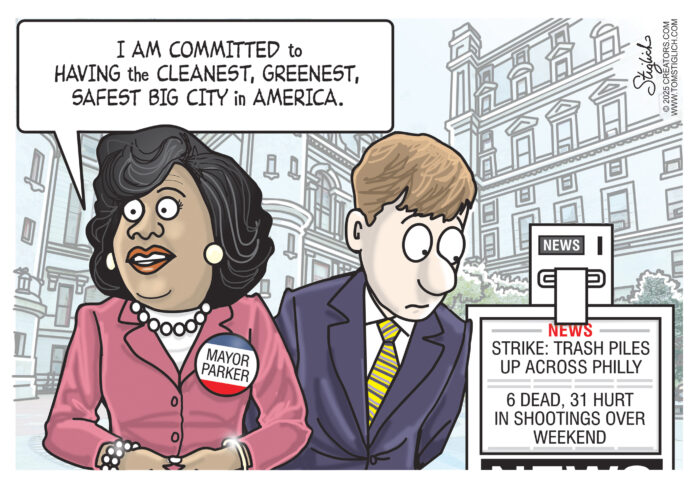Binding arbitration for city unions
On the 2nd day of the city employees strike, I went to the NE Regional Library, excited to pick up a rare book that probably traveled a thousand miles as an inter-library loan.
Union picketers were there, blocking the library and the health center shut, even though non-union staff could have kept them both open.
This is more than an inconvenience. It’s a middle-finger to those who pay your salaries. Foolish. It soured me on any union demands.
There is a big problem with public unions going on strike. Even FDR, who supported unions, mistrusted the idea of public unions, who might put themselves before public service.
DC#33 leader Greg Boulware said: “if you appreciate the labor, you have to show that in the wallet.” Seems fair.
The problem is “whose wallet?” Mayor Parker’s? No, mine and yours.
When city unions meet to negotiate with management, they hold the citizens hostage – no services. Yet we citizens have no say at the bargaining table. We’re just asked to pick up the tab.
We need to put on the ballot, binding arbitration for all city unions. The arbitration panel needs to contain members of our communities. Taxpayers need a voice here, too.
Richard Iaconelli
Rhawnhurst
Stay out of private industry
Typical Parker muddying the union contract negotiations with a future failing housing project. Negotiate the union contract and then deal with her further housing project. They are 2 separate entities. At least we will get a return and benefit from the union contract. Her housing project will be run like this: The city will build $100,000 houses at a cost factor of $300,000. The city will back the $300,000 mortgage plus closing costs for people who have never written a check or re-lit a hot water heater. Two years later the homeowners default and the city and its taxpayers own a vacant $325,000 home. Great program. They should stay out of private industry.
Richard Donofry
East Torresdale
Make America Galvanize Accountability
Every citizen has an obligation and responsibility to follow the instructions that are clearly defined in America’s Constitution. Ignorance, of the law, is no excuse to plead. Yet many still espouse complete indifference to this fact. Here in America, it does not matter who or what you are to make your voice heard; and may I add without violence. Any time is excellent to teach and learn about accountability and how anyone can excel in life. This could be done by initiating the practice of VERM (Values, Ethics, Respect & Morals). All four have separate definitions but applied together they teach accountability. Many of us need to learn this lesson. Doing this will lead to an accepted positive response instead of the current climate of lying and bullying. This is the first step in how to keep America great is to recognize the root of our problem. Too many of us only think of WE and their like-minded companions. Here in America, all should take responsibility to do what we know is beneficial to the greater population. Mentor and guide our children, family, friends and students. We all need to learn and practice this lesson from the ordinary citizens to CEOs. Most important teach the ones “who look up to you.” This will have a positive impact throughout their lives. America is already great. Now we all need self-improvement. Admittedly this will take much effort and time. Keep in mind one of my favorite sayings, “A thousand-mile journey starts with the first step.” I do apologize for preaching.
Ron Farbman
Somerton
Make more in America again
When we look back at the history of the Industrial Revolution in America, we see that it brought over 100 years of jobs and prosperity to the United States.
The Industrial Revolution in America saw many inventions that improved the lives of the American people. In 1769, James Wall developed the steam engine, which allowed factories, trains and steamboats to manufacture or transport large amounts of goods across America. In 1774, Eli Whitney created the cotton gin, which reduced the time needed to clean cotton for commercial use. In 1844, Samuel Morse invented the telegraph machine, which allowed people to communicate with each other much more easily and quickly. In 1846, Elias Howe invented the sewing machine, which allowed clothing to be mass produced in a factory setting. In 1855, Henry Bessemer invented the method of making steel out of iron. In 1876, Alexander Graham Bell invented the telephone, which changed the way people communicate. In 1879, Thomas Edison created the light bulb, which allowed people to do things at night that they could normally only do during daylight hours.
These are just a few examples of inventions that helped expand the Industrial Revolution in America. During the last 40 years we began to outsource too much of our manufacturing to foreign countries and then imported the products back for sale in the United States. Today, thousands of items invented in America to improve our quality of life and create jobs for American workers are largely manufactured in other parts of the world. An important message for Americans is that we must return to being a country that makes more of what we buy not continue to be a nation buying so much of what we use on a regular basis from foreign countries.
Everyone is asked to promote the goal of the Buy American Made Campaign as we work together to restore no less than a 50/50 balance of the products sold in America being made in America again.
Help our efforts by looking for, asking for and shopping around for products made in the USA and support the country where you live while supporting American workers who also need jobs. Thanks for your participation.
Your comments and suggestions are always welcome. Email them to [email protected]
Michael Blichasz
Torresdale





